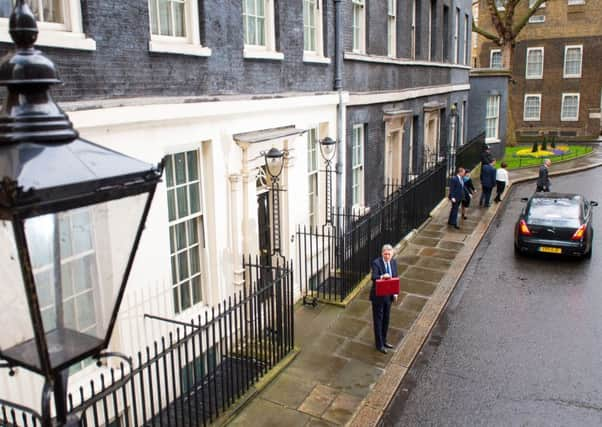Tom Richmond: '˜Spreadsheet Phil' knows we must get back in black


A hard-earned reputation from his tenureship of the Department for Transport and then Ministry of Defence, he would be personally insulted if his Budget, his first as Chancellor, unravelled like his predecessor George Osborne’s omnishambles speech of 2012.
The proverbial ‘safe pair of hands’, Philip Hammond was a contemporary of Theresa May at Oxford University and personifies the Prime Minister’s business-like approach to government.
Advertisement
Hide AdAdvertisement
Hide AdIn contrast to his aforementioned predecessor, and also Gordon Brown for that matter, Mr Hammond appears – on this early evidence – to be an old-fashioned Chancellor who understands that Britain is spending beyond its means, and has been doing so, for far too long.
Not tempted to blow the increased tax receipts at his disposal after the economy withstood last June’s Brexit vote, and then a mini-windfall from lower-than-forecast borrowing costs, he knows a £1.7 trillion national debt – rising at a rate of £5,170 per second (the length of time it takes to read this clause) and equating to £62,000 for every household in the country – is unsustainable, even more so if pre-announced cuts to business and personal taxes are to be afforded.
An economist first and politician second judging by the very modest size of the Budget ‘red book’, Mr Hammond shed his dull demeanour by retraining as a stand-up comedian, before showing a certain ruthlessness with a tax grab from the self-employed despite the last Tory manifesto promising no such National Insurance increases. That it will raise £145m, a relatively small sum, is a gamble given the likely backlash.
However, he knows that Britain can’t keep haemorrhaging money at this rate – annual debt interest charges would pay for HS2 and much more in one swoop – and that Brexit is the ‘most momentous’ ‘known unknown’ in peacetime, to paraphrase both Michael Heseltine and Donald Rumsfeld.
Advertisement
Hide AdAdvertisement
Hide AdYet, even though his prudence and resolve not to shirk difficult decisions, is given further legitimacy by Labour’s incoherence, the Budget is the one setpiece occasion of the year when policies across the social spectrum can be recalibrated for the short-term – hence the measures aimed at ‘baby boomers’ ‘generation X’ and ‘millennials’.
First ‘baby boomers’ – an additional £2bn, spread over three years, to help English local authorities pay for the care of the elderly places the onus on hospitals and care providers to minimise ‘delayed discharges’ and the resulting pressure on hospital beds. The fact there’s now half a million more people aged over 75 compared to 2010 suggests, however, this money won’t go very far.
Next ‘generation X’ – additional commitments to childcare, part of Mrs May’s wider strategy to woo ‘just about managing’ families, talk to an agenda of aspiration. There are more than 2.7m more people in work compared to seven years ago when the Tories returned to power.
Finally ‘millennials’ – the planned transformation of technical skills is long-overdue in the digital age. Though the number of Neets – young people not in education, employment or training – is falling, the figure is still too high.
Advertisement
Hide AdAdvertisement
Hide AdAt face value, these proposals will probably enhance, still further, the Government’s reputation after the Copeland by-election saw the Tories become the first governing party to win a by-election seat off their main opponents since the Falklands conflict in 1982.
Yet all they have done is buy the Prime Minister and Chancellor some time. As this is an ageing society, the care needs of the elderly will only increase and this begins the process of reversing £4.5bn of cuts to adult social care since 2010.
It’s the same with the further education colleges which will be tasked with introducing T levels – a new qualification in technical skills. This sector has seen its budget squeezed by seven per cent since the Tories returned to power in 2010, and £500m appears to be insufficient.
These students are tomorrow’s wage-earners and wealth-creators – the people whose taxes will help pay for carers so the elderly and frail can live with a degree of dignity in their twilight years. Why is this only being recognised now?
Advertisement
Hide AdAdvertisement
Hide AdYet, while borrowing has never been cheaper, it’s paradoxical that the Chancellor can’t do much more – Britain is still mired in debt and long-term growth is weaker than forecast prior to the EU referendum.
The only option, therefore, is for the whole country to become far more efficient and address longstanding deficiencies in productivity. Though public sector spending is still increasing – hardly the ‘austerity’ portrayed by the BBC and others – Britain needs do more with less if the demographic timebomb is to be defused. It’s a task every bit as challenging – politically, economically and socially – as paving the way for the country’s exit from the European Union (Brexit was barely mentioned in the Budget) without compromising trade or the future existence of the United Kingdom.
To his credit, Philip Hammond accepts that the nation’s accounts don’t add up. Now he needs to return to his spreadsheets and become the dullest, most radical, most prudent and most responsible Chancellor for a generation if the Government is to truly work for everyone, young and old alike, and deliver an agenda of compassionate Conservatism while returning to the nation’s finances to the black. After this downpayment, the hard work starts now.